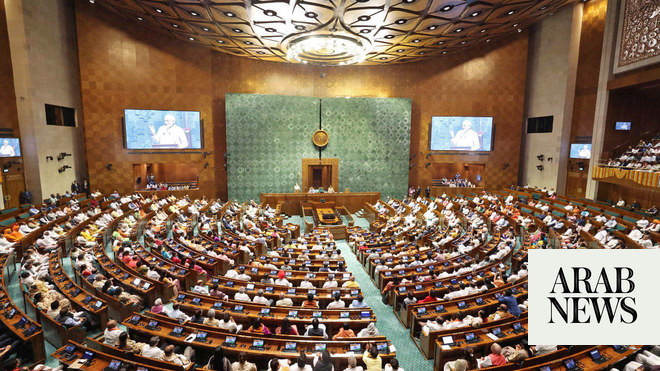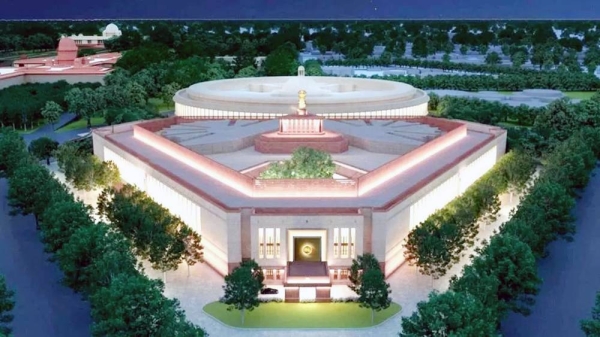
Opposition describes inauguration by Narendra Modi ‘direct assault’ on democracy
New parliament part of controversial, $2.8bn Central Vista project
NEW DELHI: Indian Prime Minister Narendra Modi inaugurated on Sunday a new parliament building in New Delhi amid a boycott of the ceremony by 20 opposition parties.
The triangle-shaped, four-storey building located in the heart of the capital cost nearly $120 million and is part of a controversial $2.8 billion revamp of the capital’s historic center called the Central Vista project.
Modi said the new parliament building was a “reflection of the aspirations of new India.”
“The new parliament building will be a testament to the dawn of a self-reliant India. It will be a witness to our journey toward a developed India,” he said at the inauguration ceremony.
FASTFACT
The triangle-shaped, four-story building located in the heart of the capital cost nearly $120 million and is part of a controversial $2.8 billion revamp of the capital’s historic center called the Central Vista project.
“Some moments in the developmental journey of a nation get immortalized, today is one such day. The new parliament complex will witness the realization of our developed India resolution.”
Modi also installed the Sengol, or a symbolic scepter, in the legislature’s lower house, a gold-plated object that the government claimed was gifted to India’s first prime minister on the eve of its independence from Great Britain in 1947.
The Central Vista project covers new construction of various government offices, including a residence and office for the premier as well as 10 blocks of buildings to house ministries and departments.
The government has stated that the new upgrades were necessary to increase seating capacity and allow for better facilities. The original parliament building, for example, dates to 1927 and had only around 800 seats combined for both the lower and upper house, while the newly inaugurated building had room for more than 1,000 seats.
Yet the project has sparked controversy since it was first announced, as civil society groups, opposition politicians, and environmentalists questioned the cost and need for all-new buildings.
Modi’s ruling Bharatiya Janata Party has also been facing backlash for sidelining the President Droupadi Murmu by asking the PM to inaugurate the building instead. Though the Indian president is a non-elected and non-executive position, they are considered a ceremonial figurehead as the country’s first citizen and highest constitutional authority.
The opposition boycott was sparked by Modi’s decision to “inaugurate the new parliament building by himself,” which national and regional opposition parties said was “not only a grave insult but a direct assault on our democracy.”
A joint statement issued by the opposition parties on Wednesday said: “When the soul of democracy has been sucked out from the parliament, we find no value in a new building.”
Aditya Mukherjee, writer and former professor at Delhi-based Jawaharlal Nehru University, criticized the timing of the project and how it was carried out.
He told Arab News: “The whole project has been mired in controversy right from the beginning because the foundation was laid at a time when the whole nation was passing through a deadly second wave of coronavirus.
“No consultation was held before the foundation stone for the new parliament was laid.”
Sunday’s ceremonial event, which also involved religious rituals and Hindu priests, also came under scrutiny.
“The whole effort is just to glorify the current prime minister. It is a matter of great shame that a parliament of the world’s largest democracy is being inaugurated in the absence of the main opposition parties,” Mukherjee said.












